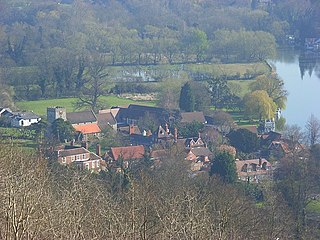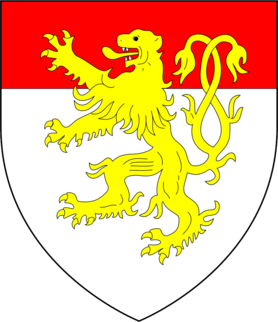Thomas Saunders (1626 – c. 1670) was an English landowner and politician who sat in the House of Commons in 1660.

The House of Commons of England was the lower house of the Parliament of England from its development in the 14th century to the union of England and Scotland in 1707, when it was replaced by the House of Commons of Great Britain. In 1801, with the union of Great Britain and Ireland, that house was in turn replaced by the House of Commons of the United Kingdom.
Saunders was the son of John Saunders of Reading and Woolstone in Berkshire (the latter now in Oxfordshire) and his wife Margaret Evelyn, daughter of John Evelyn of Godstone, Surrey. He succeeded his father in 1638 and purchased the estate of Mongewell Park in Oxfordshire, across the River Thames from Wallingford, also in Berkshire (but now in Oxfordshire). In 1660, he was elected Member of Parliament for Wallingford in a by-election to the Convention Parliament. He was commissioner for assessment for Berkshire from August 1660 and for Oxfordshire from 1661. He was J.P. for Oxfordshire from 1661, and for Wallingford and for Berkshire from 1664. [1]

Reading is a large minster town in Berkshire, England, of which it is now the county town. It is in the Thames Valley at the confluence of the River Thames and River Kennet, and on both the Great Western Main Line railway and the M4 motorway. Reading is 70 miles (110 km) east of Bristol, 24 miles (39 km) south of Oxford, 40 miles (64 km) west of London, 14 miles (23 km) north of Basingstoke, 12 miles (19 km) south-west of Maidenhead and 15 miles (24 km) east of Newbury as the crow flies.

Woolstone is a village and civil parish about 4 1⁄2 miles (7 km) south of Faringdon in the Vale of White Horse. Woolstone was part of Berkshire until the 1974 boundary changes transferred it to Oxfordshire. The 2011 Census recorded the parish population as 210.

Berkshire is one of the home counties in England. It was recognised by the Queen as the Royal County of Berkshire in 1957 because of the presence of Windsor Castle, and letters patent were issued in 1974. Berkshire is a county of historic origin, a ceremonial county and a non-metropolitan county without a county council. The county town is Reading.
Saunders died between 25 October 1669 when he made his will and 15 February 1671 when it was proved. [1]
Saunders married twice: Firstly to Anne daughter of Thomas Morris of Great Coxwell in Berkshire (now Oxfordshire) and had two sons and a daughter; [1] Secondly to Anne daughter of John Allen and widow of Dudley Avery, both of Streatley, also in Berkshire.

Great Coxwell is a village and civil parish about 2 miles (3 km) southwest of Faringdon in the Vale of White Horse, England. It was in Berkshire until the 1974 boundary changes transferred it to Oxfordshire. The 2001 Census recorded the parish's population as 274.

Streatley is a village and civil parish on the River Thames in Berkshire, England. The village faces Goring-on-Thames. The two places share in their shops, services, leisure, sports and much of their transport; across the river is Goring & Streatley railway station and the village cluster adjoins a lock and weir. The west of the village is a mixture of agriculture and woodland plus a golf course. The village has a riverside hotel. Much of Streatley is at steeply varying elevations, ranging from 51m AOD to 185m at Streatley Warren, a hilltop point on its western border forming the eastern end of the Berkshire Downs. This Area of Outstanding Natural Beauty is topped by the 87-mile The Ridgeway path, which crosses the Thames at Goring and Streatley Bridge.




